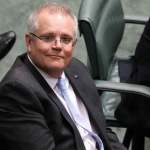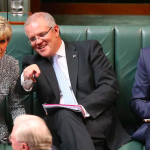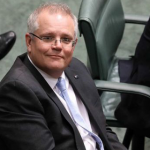Morrison’s Xmas Gift: New Laws to Further Erode Your Civil Liberties

The Abbott/Turnbull and now Morrison government has unleashed a swag of draconian laws in the final parliamentary sitting weeks of this year. And it’s hoping to ram through another lot before this last week is out.
The Defence Amendment (Call Out of the Australian Defence Force) Bill 2018 was passed on 27 November. This legislation lowered the threshold of when the government can send in the Australian Defence Force (ADF) to assist state and territory police forces with domestic incidents.
Prior to its passing, the troops could only be sent in when state authorities had exhausted all options, now they can be sent in to “enhance” the ability of local police. And the bill also specifies certain circumstances in which the troops can be deployed to break up protests and strikes.
Backdoor access
Peter Dutton’s baby – the Telecommunications and Other Legislation Amendment (Assistance and Access) Bill 2018 – is set to pass with bipartisan support this week, after the major parties came to loggerheads over the legislation late last week and its passage looked set to be blocked.
This bill provides law enforcement and security agencies with access to citizens’ encrypted messages by requiring communications providers to give assistance in gathering data. And it also sets up a new warrant system enabling authorities to covertly obtain evidence from electronic devices.
Taken together these two bills can be thrown on the pile of more than 70 other pieces of legislation that have been passed at the federal level in the name of counterterrorism since 9/11 that have been incrementally eroding citizens’ rights.
Special forces deployed domestically
“Troops on the streets on the say-so of a federal minister” and the ability “to stop someone and demand their ID even if they are not suspected of any wrongdoing”, this is the bleak picture Civil Liberties Australia CEO Bill Rowlings paints in relation to the new defence call out laws.
“Powers to shoot to kill,” he went on, “with the Nuremberg defence – “I was just following orders” – as an excuse when something goes wrong – and it will.”
The ADF laws allow troops to be sent in to target “domestic violence” incidents, which is a broad term contained in section 119 of the Australian Constitution.
The bill’s updated explanatory memorandum explains that “peaceful protests, industrial action or civil disobedience” aren’t consider domestic violence.
However, the actual legislation leaves the term undefined. And while new section 39(3)(b) provides that troops can’t generally be sent in to deal with “protest, dissent, assembly or industrial action”, they can if there’s a “reasonable likelihood” of death, serious injury or “serious damage to property”.
According to Mr Rowlings, “if protesting school children planned to paint slogans on the fences around Commonwealth property” then theses new laws would allow for armed forces to be deployed against them.
“And we are all aware that the current government doesn’t believe children should be involved in protests,” he added.
Accessing apps and social media
At the end of last week, Labor was calling for amendments to be made to the Assistance and Access Bill over concerns the new measures may affect national security. However, the major parties have now come to an agreement with some new safeguards in place.
The bill allows authorities to access encrypted data stored by communications providers via three avenues. A technical assistance request allows providers to give voluntary assistance to authorities in gathering information from their systems.
A technical assistance notice is a compulsory request made by the director general of security, which requires a provider to give assistance they are already capable of providing, such as decrypting any information that they have the ability to do so.
And then there’s the technical capability notice, which is another compulsory request requiring a provider to build a new capability that will give authorities access to data information. Both these compulsory requests are made under the threat of major fines if they’re not carried out.
One of the extra safeguards the major parties agreed to this week was that a technical capability notice must be approved by both the attorney general and the communications minister, whereas previously it was only the attorney general that had to approve it.
Attorney general Christian Porter explained that another new safeguard is that the laws only apply to serious offences. However, the new warrant system that allows for snooping on citizens’ devices already only applied if a suspected offence punishable by at least 3 years gaol time has been committed.
Centralising control
“The prying powers that the government wants would enable ultimate bureaucratic control over citizens,” Mr Rowlings made clear. “With all of us so dependent on communication devices, no aspect of our lives will be free from government prying.”
The long-time civil liberties advocate notes that Peter Dutton has always been “personally driven” to rein in citizens’ privacy in order to establish a centralised system of government control. And he pointed to a quote from the home affairs minister’s maiden speech in parliament as proof of this.
“We must set ourselves on a course of information sharing between law enforcement agencies and other government departments, with this end in mind: when does the right of privacy for the individual start to impinge on the common good of society?” Mr Dutton told the parliament in 2002.
The twilight of the Coalition
“In the dying days of a government,” Mr Rowlings warned, “there is a real danger that ideologues currently in power will try to entrench their beliefs of how the world should operate into black letter law.” And this not only applies to policing and security, but also to social and environmental issues.
And with the next federal election confirmed for May, this leaves Morrison and his climate change denying cronies around six months to try and enact laws and impose policies to their own benefit. The new ADF call out laws, along with the powers to access personal data, are examples of this.
“These two laws simply extend a dangerous and worrying trend in the wrong direction for Australia,” Mr Rowlings concluded, “away from individualism and federated systems towards groupthink and centralised control by a political, bureaucratic and police-military-security elite.”







